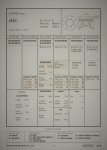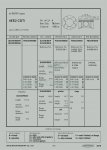Daithi
Cadet
- Joined
- Jul 6, 2015
- Messages
- 7
I know this may not be a well known engine but I'm hoping someone on here can share experience of these engines rebuilt with non-Mercruiser pistons. Merc/Cummins pistons clock in at over $250 each (with rings extra) putting a set of pistons and a head gasket around $2000 before Labour
I came across at least two of these rebuilt engines in recent years. Both had used Isuzu auto pistons as it’s an Isuzu block but they have a slightly different combustion chamber in the piston crown. I don’t know how they fared long term.
So while no one is advertising about using non-Mercruiser parts they are getting used. I'd really like to hear if anyone has any information on using alternate pistons especially as the outrageously priced Mercruiser ones seem to fail anyway. I was careful to buy an engine with the modified-against-pistons-melting serial numbers (88+) but that doesn't guarantee a trouble free life as the wastegate seizing can cause similar problems as I suspect I have a cracked piston.
Many thanks for at least reading this post.
I came across at least two of these rebuilt engines in recent years. Both had used Isuzu auto pistons as it’s an Isuzu block but they have a slightly different combustion chamber in the piston crown. I don’t know how they fared long term.
So while no one is advertising about using non-Mercruiser parts they are getting used. I'd really like to hear if anyone has any information on using alternate pistons especially as the outrageously priced Mercruiser ones seem to fail anyway. I was careful to buy an engine with the modified-against-pistons-melting serial numbers (88+) but that doesn't guarantee a trouble free life as the wastegate seizing can cause similar problems as I suspect I have a cracked piston.
Many thanks for at least reading this post.

































